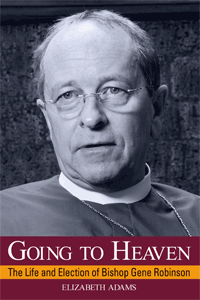Going to Heaven: The Life and Election of Bishop Gene Robinson

"Gene Robinson," says the back-of-the-book blurb, "is the first openly gay bishop in Christendom and his election has set off a worldwide firestorm of reaction...."
This book moved me twice to tears. Once very early on, in the prologue, in which the author describes her own confirmation, and its intimation of a promise which she -- shortly thereafter moving away from the church, and spending decades away from it -- would not learn to understand or fully receive for many years:
That confirmation day was the last time I would ever wear a white veil, and I would not make an unconditional promise to obey anyone or anything again until I made my way back to the church and to a differently-understood God many, many years later.
But something did happen at that altar rail, something I could not undo or escape. I felt it happen when the bishop laid his hands on my head and said:
Defend, O Lord, this thy child Beth with thy heavenly grace, that she may continue thine for ever, and daily increase in thee more and more, until she comes to thy everlasting kingdom.
I had no idea what that prayer meant. I responded to its poetic language and cadence, and to its calm formality, but sensed something more: a convenant, a promise.
This book has a hero. He's aged and old-fashioned, sometimes intolerably complacent, and sometimes over-involved in his financial well-being and daily comforts, but at times -- and especially at crises -- transcendently noble and awe-inspiring. I'm speaking of course not of Bishop Robinson, who is none of those things. Robinson is a thoughtful, engaging, generous-spirited man of great ability and great faith, of whom one grows very fond in the course of reading this book. But he's not the hero of it. The hero is the American Episcopal Church. Again and again it rises to the challenges presented to it. This is the second passage that moved me to tears. It's Robinson speaking about the Convention in which his election was confirmed:
"I was seated in the House of Bishops right before the end of Convention," he said, "and at the first break, one of the bishops who had voted against me and had stood up with the group who said, 'This is the worst thing that's ever happened in the history of the church,' came over and knelt down beside my chair and said, 'Hello, I'm Bishop So-and-So from the diocese of So-and-So.' He said to me, 'When you were introduced to the House today, I neither stood nor applauded like the others did, and two minutes later I was thinking, "What a lousy way to begin a relationship." So I hope you'll forgive me. And this is going to be really hard for me, but I'm going to work as hard as I can.'"
To me, the central story of this book is not Robinson's personal story. It's the story of a community of faith taking its ideals and its communion seriously. Churches need not be -- though they too often are -- clubs of like-minded people congratulating each other on their spiritual correctness. They can be communities that challenge their members to transcend their prejudices and interests, to leave the comforts of their certainties, to bring each other to face the fact that what they profess and and what they do don't match up.
The inspirational story here, to me, is the story of people determined to do the right thing, the vestries and volunteers who worked to make "a church with no outcasts," and the clergy who understood, however uncomfortably, that a church of Jesus has to be a church of radical inclusion. Robinson summed it up:
"We have those big red, white and blue signs that say 'The Episcopal Church Welcomes You.' And unless we're going to put an asterisk after that and in fine print list the people we don't really mean it about, then we better start acting that way."
If you read the Cassandra Pages you'll be entirely unsurprised at the unobtrusively beautiful writing here. You will also recognize the passion for inclusion -- which includes her opponents. She never travesties or belittles the opposition, and there is never a hint of triumphalism. At his consecration Robinson said, "There are many faithful, wonderful Christian people for whom this is a time of great pain, anger and confusion. God is served by our being loving to them."
Once at my sangha, Lama Michael was asked a question -- I forget the exact question now, but it was about not being a Christian in a Christian society. And after his usual long pause, he began his answer by saying, "Well, I'm not entirely sure that I'm not a Christian." This book engenders a similar uncertainty in me.
No comments:
Post a Comment